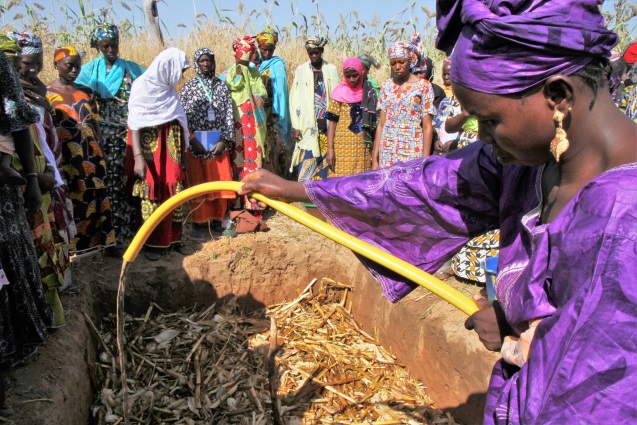Innovative approach to trainings on climate change for Mali

Working directly with the relevant public training institutions to build capacity for governmental key actors on climate change is a new approach in francophone Africa; an example from the Malian State.
Although Mali has adopted a National Climate Change Policy and accompanying Action Plan in 2011 there is a missing link to the development plans of the country: climate change aspects are still neglected in the governmental planning and budgeting processes. Therefore, the IKI funded project PICP (Innovative development planning integrating adaptation to climate change in Mali) supported the development of training modules to respond to the essential need to establish this link.
The National School of Administration (ENA) and the Training Center for Local Authorities (CFCT) developed seven specialised training modules on climate change. These two Malian training institutions instruct government officials at the national and sub-national level as well as elected officials on national level and for the parliament. These key actors are provided with the necessary capacities to integrate climate change issues into all levels of development planning.
 Workshop during a training with officials of the subregion Kita; Photo: Emile Dakouo
Workshop during a training with officials of the subregion Kita; Photo: Emile Dakouo
The trained decision-makers and planning experts act as change agents within their institutions. They make sure that considerations of climate change adaptation and mitigation become an integral part of developing policies, strategies, plans, programmes and projects at national, regional and local level.
Scaling-up innovation
This strategy of working directly with the relevant public training institutions to build capacity for governmental key actors on climate change is a new approach in francophone Africa. To ensure continuity the training modules will become part of the standardised curriculum of ENA and CFCT. Experienced national experts conduct the trainings and form a strong pool of trainers. With their disposal, the extension of these trainings to other Malian institutions and further countries in the francophone sub-region is envisaged, as this training is unique for the entire region. The PICP sister project ASNACC (Supporting the National Strategy for Adaptation to Climate Change) will continue to collaborate with both institutions to support the scaling-up.
 Female farmers during a training in the Koulikoro region; Photo; Emile Dakouo
Female farmers during a training in the Koulikoro region; Photo; Emile Dakouo
Beneficiaries of the training
Apart from the official launch of the ENA and CFCT trainings with 120 participants, specific modules were already used previously to train more than 3500 decision-makers and development planners, 65% of whom women, in the framework of the PICP and ASNACC projects. For example, the module on the scientific basis of climate change and its link to development as well as the one on integrating climate change into local planning supported the establishment and revision of development plans in four regions, seven sub-regions and 20 municipalities. The purpose of the trainings is to train the Malian decision-makers and administration on the challenge of climate change and the actions necessary. The most important is the integration of climate change into development plans at all levels of Malian authorities.
The link has been copied to the clipboard
Contact
IKI Office
Zukunft – Umwelt – Gesellschaft (ZUG) gGmbH
Stresemannstraße 69-71
10963 Berlin












